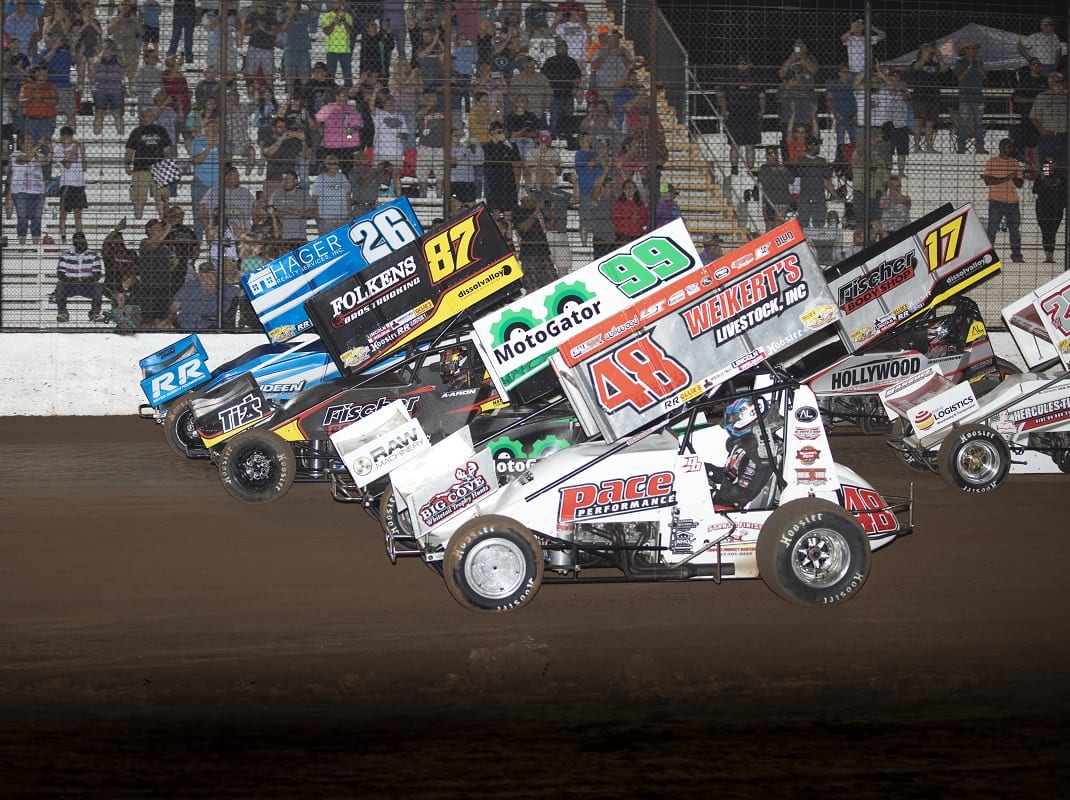The COVID-19 pandemic swept people off their feet much like a tsunami, literally and figuratively.
As millions around the world were diagnosed with the virus and hundreds of thousands succumbed to the effects of the pandemic, survival became the mantra for both business and life.
Sprint car racing was impacted as much as any industry once the shutdowns became routine in the middle of March. As social distancing grew into the theme throughout the spring, leaders in the sport struggled to find the correct path — a route that became slightly more clear, yet remained uncertain, once summer arrived.
“It’s definitely not ideal, but I don’t want to underplay what’s going on in the rest of the world with the pandemic,” defending World of Outlaws NOS Energy Drink Sprint Car Series champion Brad Sweet said. “It’s very important that we take it very seriously and understand there are families and lives affected. As a guy trying to make a living in an entertainment industry as many other athletes do, we don’t have the millions of dollars in the bank account, so it hits us pretty hard at home. It’s a big deal if we aren’t racing. We don’t make money if we’re not at the track.”
The World of Outlaws halted its season on March 13 — only hours before an event in Texas.
The series remained on hold until May 8, postponing or canceling 17 races during the nearly two-month holding period. Since its return, the planned racing schedule has been mostly scrapped, with series officials releasing races in chunks of three or four weeks.
“You have to be creative in your ways to get by,” Sweet said. “Hopefully, we can get past the worst parts and we can find a cure, a vaccine, whatever will be the right way to be able to start getting back to our normal lives.
“I try to do other things as far as stock markets. It’s hard to do much personal stuff or spend much time (outside of) racing when you’re in the sport because that’s all the time. I’m always looking and trying to think about our future,” Sweet added. “We made a few moves. I own a rental house. I’ve invested in the stock market quite a bit. I have other plans and agendas, but nothing where I’d be able to stop racing.”
Although racing returned following the hiatus, many events were run without fans or with a limited number of spectators allowed in the grandstands. That forced World of Outlaws officials to reduce the nightly purse in order to offset the losses.
“Everything is a business,” Sweet noted. “There’s a bottom line. If the bottom line doesn’t make sense, it doesn’t work for the driver, the owner or the promoter. We’re all adjusting how to make that bottom line work. There’s less revenue at the gate, but maybe more pay-per-view money. I’m looking at my travel expenses and adjusting my life on the road. There are a lot of adjustments in the world let alone our business. We’re doing the best we can to make it all work.”
Lucas Oil ASCS National Tour officials were also forced to reduce the race purses once racing resumed in late June. In addition, both the World of Outlaws and ASCS National Tour officials have had discussions with drivers about potentially reducing the point fund this year depending on the number of races completed.
“I understand,” said ASCS National Tour competitor Blake Hahn, whose grandfather, Emmett Hahn, established the series in 1992. “I get it. It sucks we’re not racing for the full amount. Just to be able to be at the track, any part of income is better than none. I’m really just happy to be at the track.”
Blake Hahn planned on tackling select 410 winged sprint car races prior to the pandemic. With the ASCS National Tour being dormant for more than 15 weeks, Hahn rushed that plan forward in order to join the Ollie’s Bargain Outlet All Star Circuit of Champions return to the Midwest in June.
“It was planned to tiptoe into it this year to fill in our schedule with the 410 stuff rather than regional races,” he said. “With the All Stars being jammed up in Ohio and coming down here (to the Midwest) for nine nights, we figured what better way to do it than at tracks we’ve been to.”
To continue reading, advance to the next page.
